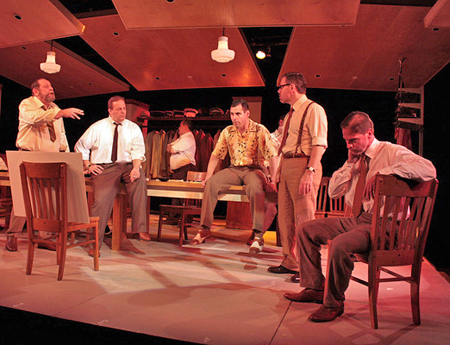
Follow the bouncing script: Reginald Rose’s tense and timely television play, “Twelve Angry Men,” unveiled and underlined the dramatic goings on within a jury room in 1954. Sidney Lumet turned it into a film in 1957 (there’s also been an Indian and Russian film). Mr. Rose himself wrote a stage version in 1957 which roamed the hinterlands and Europe and finally found its first home on Broadway at the Roundabout’s American Airlines Theatre in 2007. And last year, in Lebanon, there was a severely changed script staged and acted by Lebanese state prisoners.
Now, we have our own homegrown, impelling and absorbing mounting of “12 Angry Men,” courtesy of director Michael Disher, as the middle play of his January theatrical trifecta at the Southampton Cultural Center. This one is an acting feast for 14 local male actors, who, guided into giving top-notch performances by this top-notch director, have plunged wholeheartedly into Mr. Rose’s back of courtroom drama with a highly charged investment of fiery energy.
Last Saturday night, the players took about 10 declamatory minutes of the first act to warm up to their roles. But, once there, they engaged mutual gears and created a crackling good drama, sizzling with a full menu of confrontations.
True, “Twelve Angry Men” is beginning to show its age; modern courtroom dramas in the electronic, DNA age are likely to have different details and arguments. But Mr. Disher, in his setting and in his costuming (he designs as well as directs), has created a thoroughly believable 1950s period piece and an atmosphere in which many of the motivations for the reasoned and unreasoned arguments of the jurors have an uncomfortable contemporary ring to them. And it’s this ageless (alas) process of unreasonable reasoning that the players in Southampton, with a great deal of finesse and vitality, bring to vibrant life.
A young boy is charged with murdering his father, and the judge has cautioned the jury that to find him guilty requires a determination that his culpability is beyond a reasonable doubt. When they first enter the jury room, 11 of the 12 jurors are ready to instantly pronounce him guilty, send him to his execution, and go home to their families.
But juror number 8, the lone holdout, has other perceptions and other concerns. In a performance that’s continuously gripping in its quiet power and multiple dimensions, Joe Pallister peels away the prejudices and mindset of the dedicated punishers. But not easily nor swiftly, and that’s the suspenseful framework that the playwright has constructed, and which makes this such an absorbing work.
Mr. Pallister, by his impressive skill, combined with the adroit writing of the character, may be the star. But his brightness is matched handily by the rest of this tightly wrought ensemble. The level of performance is universally elevated and telling, from the quiet effectiveness of Christopher Trykko, Ted Lapides, Paul Consiglio and Rich Gardini, to the struggling, conscience stricken awareness of Dan Becker as the lone immigrant on the jury. There’s comic relief impressively added by Randall Krongard as the cerebrally deprived, gum-chewing and abrasive juror number 7.
Matthew Ruggiero is movingly affecting as the one juror who can identify with the accused boy’s street life. Robert Beodeker lines out the varieties of stubbornness and semi-blindness of privilege, while Matthew O’Connor sensitively portrays how an individual can get swept up in group consciousness.
And then there are the hotheads in the jury room, each with a different motivation: Stephen Scheck creates a telling portrait as a not-so-closet racist, delivering his revealing monologue with fervor and fever. And Billy Paterson is arrestingly explosive as the most emotionally vengeful and angriest of the 12 angry men.
There’s physical conflict aplenty, as the fury level steadily increases during the swift propulsion of events, and it all takes place in Southampton with the reality that solid directing and acting and the intense immediacy of the theater provide.
Mr. Disher’s economical set makes creative use of the Southampton Cultural Center’s unique facilities; Peter Eisenberg’s lighting design underlines the spareness and isolation of the jury room.
“Twelve Angry Men” is a classic study in suspense, which is one of the most captivating tools of the theater when it’s handled well, as it is in its present incarnation in Southampton, and it all adds up to a good, uncomplicated and satisfying hour and a half of solid entertainment.
“Twelve Angry Men” will be replaced by “The Laramie Project,” the third of the trio of the Center Stage’s Triple Play, next weekend, then resumes for an evening and a matinee performance on February 6 and 7, respectively. Information and tickets are available at www.southamptonculturalcenter.org.